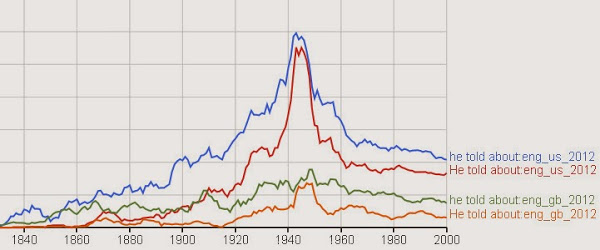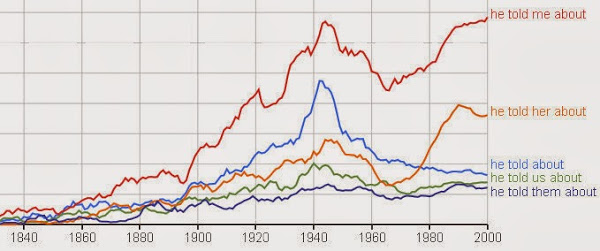Some random thoughts on tell about
Why that enormous peak?
The situation in British English
- 181 examples of 'told about', nearly all passive, a few relate to stories etc. Three possible examples of the construction we're interested in:
- Then I told about the tales the neighbours were telling about her Mum and her men friends.
(Where there's life. Dayus, Kathleen. London 1991) - Way, watching Faldo's charge, told about his horror story which began on the eve of the Swiss Open
(The Daily Mirror. London, 1992) - Also taking part in the programme were Flossie and Bill Jarvis, giving their memories of journeys on the railway and the Rev. Ray Arnold, who lives in the former Horderley station bungalow, told about his finds on the site.
(Bishop's Castle Railway Society Journal, 1990)
- Then I told about the tales the neighbours were telling about her Mum and her men friends.
- 42 examples of 'tell about'. Quite a few candidates for inclusion:
- Let the children in the classes do the talking, let them tell about those aspects of the school that they like best
(Marketing your primary school. Sullivan, Mike. Harlow, 1991) - She must stop it, tell about Joe's terrible plight.
(The Challenge book of brownie stories. Moss, Robert. Gloucestershire 1988) - What does each picture, on pages 19-20, tell about the costs of the inputs for farmers?
(Decisions in geography: the United Kingdom. Farleigh Rice, W. Harlow 1985) - Another older woman, who had lived alone with her mother since her father died, recalled the satisfaction of coming home to someone with all the time in the world to listen to what she had to tell about her day in the office or an evening at choir practice.
(Forty plus. Batchelor, Mary. Tring, Herts 1988) - Mr Loveitt wants to hear what you have to tell about being aboard the Princess.
(The first of midnight. Darke, Marjorie. London 1989) - Teacher: Try to tell about the story you have read.
(Literacy. Cashdan, Asher. Oxford 1986) - I must tell about the curious will he left.
(A compass error. Bedford, S. London 1993) - They go to tell about
(Strangers — talk by PC Bruce 1993) - In Shakespeare's day, didn't he tell about people wearing skull rings and brooches to remind them of death.
(Cathedral. Maitland, I. London 1993) - so the small knot of idlers and gawpers dispersed, back to the quays and the eating houses to tell about what they'd seen, and Huy and Merymose were left alone.
(City of dreams. Gill, Anton. London 1993) - There's this guy, see, he thinks he's pretty street-smart, but sometimes these things happen, he's not so sure, and he wonders, can he really tell about this one particular girl, who he really likes her, but you can't tell by looking, can you?’
(The Laughter of Heroes. Neale, Johnathan. London 1993) - Tuathal, who knew that thoroughness was the secret of success, had long since extracted from Thorkel Fóstri all that he could tell about Earl Siward of Northumbria, and had deduced a good deal more.
(King hereafter. Dunnett, Dorothy. London 1992) - Right here I just wanted to tell about the first time I ever saw him.
(Hombre. Leonard, Elmore. UK 1992)
- Let the children in the classes do the talking, let them tell about those aspects of the school that they like best
- 14 examples of 'telling about', including the following:
- When we examine prophecy in the Bible we soon conclude that it can be predictive (telling about the future) or proclamatory (telling about God) or both.
(Church planting: our future hope. Cleverly, Charlie. London 1991) - Flavia longed to go back and slip into her place just as the soup was brought and hear them telling about Loulou's day.
(A compass error. Bedford, S. London 1993) - The dead were consumed by cleansing fire at a ceremony which every Renascian was bound to attend and there would usually be a carefully arranged display of the dead person's life and a small booklet telling about his life and his work, nearly always written by Snizort and Snodgrass in gentle and tactful collaboration with the bereaved family.
(Rebel angel. Wood, B, London 1993) - You were telling about that witch story afore, is that something that your father told you?
(Orkney Sound Archive 1985) - It was the talk of the trade that Ken would be outrageous there on certain afternoons of the week, telling about his great aunt and the Gates of Heaven Ajar or pulling one of his fellow actors down to his own idea of size.
(Kenneth Williams: a biography. Freeland, Michael, London 1990) - 5 examples of 'tells about', four of which seem to fit the bill:
- The centre of this novel is the interpolated tale of the dead and beloved Tom Outland, who discovers a prehistoric and beautiful city in the sun on the mesa, and tells about it in immediate, enthusiastic prose.
(The Independent, electronic edition, London 1989) - Reyburn tells about the panic before the coronation of the present Queen when the special needs of the assembled elderly peers had to be anticipated.
(She magazine, London 1989) - David tells about his night-time television viewing being interrupted by a prompting to pray; then of several trips to New York all with no clear understanding that he was to set up a programme for those involved in drug abuse.
(Church planting: our future hope, Cleverly, Charlie. London 1991) - Most women will relate to ‘Two Minute Brother’, which amusingly tells about ‘2 short, 2 inch, all mouth, no action, 2 minute fuckers’
(Hot Press. Dublin, Ireland 1991)
- Is it ... am I worth telling about?
(A compass error. Bedford, S. London, 1993)
Conclusions from the British National Corpus
A Compass Error, by Sybille Bedford
| tell about | 3 |
| told about | 1 |
The situation generally
| tell about | 472,000 |
| tell us about | 1.9 million |
| tell me about | 1.1 million |
| tell you about | 1.0 million |
| tell others about | 324,000 |
| tell them about | 256,000 |
| tell friends about | 245,000 |
| tell him about | 95,000 |
| tell her about | 69,000 |
| tell people about | 64,000 |
Tell about the South
The strange case of Upton Sinclair
| World's End | 1940 | 5 |
| Between Two Worlds | 1941 | 2 |
| Dragon's Teeth | 1942 | 1 |
| Wide is the Gate | 1943 | 7 |
| Presidential Agent | 1944 | 3 |
| Dragon Harvest | 1945 | 10 |
| A World to Win | 1946 | 10 |
| A Presidential Mission | 1947 | 3 |
| A Giant's Strength | 1948 | 16 |
| One Clear Call 2 | 1948 | 4 |
| Oh Shepherd Speak | 1949 | 7 |
Update - William Faulkner 1897-1962
- Uncollected Stories of William Faulkner 2011
9 results for "told about"
4 results for "tell about"All that day the halfwit told about the dollar and seventy-five cents which Grant had taken from him
- Faulkner Reader 2011
4 results for "told about"
2 results for "tell about"they told him it was Saturday again and paid him and he told about it
- As I lay dying 1930 (contains quite a bit of non-standard English)
1 result for "told about"
2 results for "tell about"listening to us tell about how quick the bridge went and how high the water was
- Sanctuary 1931
1 result for "told about"She told about lying in the darkness with Gowan snoring beside her
- Light in August 1932
5 results for "told about"
3 results for "tell about"He told about the negro girl in the mill shed on that afternoon three years ago
- Absalom, Absalom 1936
1 result for "tell about"Tell about the South. What it's like there.
- The Hamlet 1940
1 result for "told about"
1 result for "tell about"He told about it: how they had discovered almost at once ...
- Go Down Moses 1942
1 result for "told about"... that noon when the train-crew told about it
- The Town: A Novel of the Snopes Family 1957
2 results for "told about"And when he told about it, he was downright crying
- The Mansion 1959
1 result for "told about"She told about Ernest Hemingway and Malraux
- The Reivers 1962
1 result for "told about"Miss Reba told it, sitting in the car, with Grandfather and Colonel Linscolm and me standing around it because she wouldn't come in; she told about Boon and Butch.
Links
Collocation finders
- Just the Word - tell
- Just the Wordp - tell + Prep
- Just the Word - tell + Adv
- Netspeak - tell about
- Netspeak - tell + ? + abou
Writers
- James M. Cain - dialect usage at Google Books
- Upton Sinclair - Wikipedia
- Sybille Bedford - Wikipedia
Other
- Pain in the English
- Tell About the South
- Avoid Common Mistakes In English
Some mistakes made by foreigners while speaking English are more common than other ones. I hope this might help some of you and reading it will take only a few seconds... Let’s get started.To tell and to sayWe will learn the usage of the verbs 'to...
- Random Thoughts About "on Tomorrow"
In January 2001, a correspondent from New Orleans, Louisiana, wrote to the grammar website CCC.net's GrammarLogs, saying: Recently, I have heard people at work using the phrases "on yesterday", "on tomorrow" or "on today" in their spoken language...
- Common Mistakes Learners Make - According To Me
When giving your opinion, it is quite common in some languages, for example Polish, Spanish and Italian, to use a construction which can be directly translated as according to me: Polish - według mnie Spanish - según yo Italian - secondo...
- Google Search Results: Treat With A Large Pinch Of Salt
When deciding whether a certain construction or phrase is natural English or not, it makes sense to check how it is actually used. One way of doing this is to use corpora, but they can be quite complicated for laymen like me to use. And as we have...
- Random Thoughts On The Expression Vanishingly Unlikely
At language blog The Stroppy Editor, Tom Freeman takes the Guardian to task for the way it treats part of a submission (for a government consultation process on child poverty) from a team led by Alan Milburn, "ex-Labour minister turned coalition...


